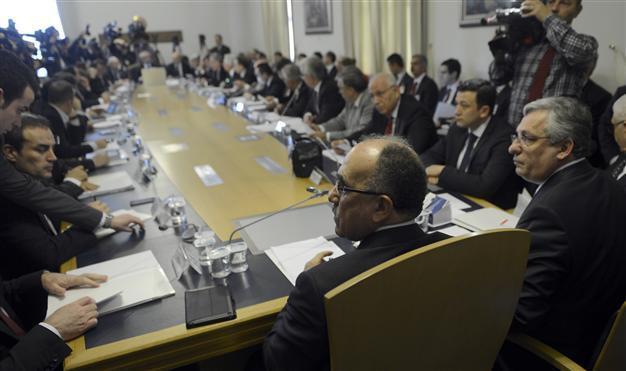Turkish gov't takes a step back on intel bill upon harsh criticism
ANKARA

The MİT law was discussed at Parliament's Internal Affairs Commission on Feb 22. AA photo
Upon strong criticism from the public and the opposition parties, the government has taken a few steps back regarding its bill to equip the National Intelligence Organization (MİT) with expanded powers.After lengthy discussions on Feb. 22, the first day of debates over the bill, Parliament’s Internal Affairs Commission resumed debates on Feb. 23, with the ruling Justice and Development Party (AKP) indicating that it was willing to take the bill to the General Assembly this week.
The Commission was set to debate AKP motions apparently aimed at retouching the most controversial parts of the proposal, such as turning the MİT into an intelligence coordination body that will work exclusively under Prime Minister Recep Tayyip Erdoğan.
That arrangement, along with an article saying the MİT would “fulfill all kinds of tasks regarding external security, the anti-terror fight and national security” that are currently assigned by the Cabinet, led the opposition to liken the proposed system that of the Syrian regime. Syrian President Bashar al-Assad’s “mukhabarat,” or secret police, is a blanket term for an array of sometimes overlapping and mutually mistrustful security services.
Eventually, the government has withdrawn an article that would make the prime minister the “President of the National Intelligence Coordination Board [MİKK].” Accordingly, the MİKK will continue to be presided over by the MİT undersecretary.
Apart from that change, another new motion would decrease from 12 years to nine years the maximum penalty for media bosses whose outlets publish intelligence documents.
The three-year minimum penalty for the same crime, however, remains unchanged. Thus, as the minimum penalty will not be reduced to two years, it would not be possible to postpone prison sentences in the event of media owners, content providers, correspondents, authors, editors and publishers being convicted on charges related to exposure of MİT documents. At present, only sentences for crimes that require imprisonment of less than two years can be postponed.
Deputy Prime Minister Beşir Atalay, who attended debates at the Commission late on Feb. 22, attempted to assuage the concerns of opposition lawmakers.
“Legal intelligence and preventive intelligence is also dependent upon the judiciary in our country. Here, we are renewing that promise. We need Parliament’s auditing about security and we also need to work with Parliament. We also need to include all other security units into this work,” Atalay said.
8,000 staff
The debates at the Commission also revealed the number of staff at the MİT, which had previously not been announced, on the basis of being secret information. Until now, the precise number of staff working at the MİT was always given as a “reasonable amount.”
According to the information disclosed at the Commission, around 8,000 staff members are working for the organization, most of whom are employed at the undersecretariat in Ankara’s Yenimahalle district and provincial directorates in Adana, Ankara, Diyarbakır, Istanbul and İzmir.
The Commission also revealed that the MİT has units working abroad and is currently wiretapping the telephones of 2,473 people, mostly related to “terrorism and spying activities.”
Business circles, data processing centers
Another article that has led to concerns, particularly among business circles, gives the MİT the authority to access the databases of banks and all kinds of other economy-related institutions, which would end business secrecy and privacy.
The MİT would also have the authority to use the data processing centers of these institutions, as well as their communication infrastructure. Those who receive such a demand from the MİT would not have the right to object by relying on their own regulations.
Bill lays legal ground for talks with PKK
ANKARA
he bill will also bring in an arrangement that would provide a legal framework for the ongoing talks between intelligence officers and the outlawed Kurdistan Workers’ Party (PKK).“In situations that the country’s security and national interest require, the MİT [the National Intelligence Organization] will be able to directly contact all kinds of local and foreign institutions and agencies, and with all organizations or formations and persons; will be able to implement appropriate coordination methods; and will be able to collect data related to foreign intelligence, national defense, terrorism, international crimes and cyber security that passes through telecommunication channels,” says the related article of the bill.
Parliament’s Internal Affairs Commission resumed debates on the bill over the weekend and the ruling Justice and Development Party (AKP) expects that it will reach the General Assembly floor this week.
In December 2012, Prime Minister Recep Tayyip Erdoğan made public that intelligence agents were meeting with jailed leader of the PKK, Abdullah Öcalan, thus exposing a “resolution process” aimed at peacefully ending the three-decade long conflict between Turkey’s security forces and the PKK.
Responding to criticism by opposition lawmakers during debates at the Commission late on Feb. 22, Deputy Prime Minister Beşir Atalay touched upon the process.
“What is appropriate is contact by the state institutions, but responsibility belongs to politics, not to the MİT undersecretary. He goes and has meetings, he may also go to İmralı for meetings, but the responsibility belongs to the government,” Atalay said, referring to İmralı Island in the Sea of Marmara, where Öcalan is serving a life sentence.
“When the prosecutor’s office called the MİT undersecretary, the prime minister said: ‘It’s my responsibility, I gave him the order,’” he added.
Atalay, who is actively involved in the peace process, was referring to a crisis that erupted in February 2012 after a specially authorized prosecutor summoned MİT Undersecretary Hakan Fidan and four other MİT officials to testify in the ongoing investigation into the Kurdistan Communities Union (KCK), the alleged urban wing of the PKK, on the grounds that some MİT members who infiltrated the KCK had exceeded their authority in their duties.
Fidan had attended talks between MİT officials and representatives of the outlawed PKK at a time when he was a special adviser to Erdoğan. The talks were held abroad between 2009 and 2011 in a series of meetings publicly known as the “Oslo talks.” The talks collapsed after a PKK attack killed 13 soldiers near Diyarbakır in July 2011.
At the time of the investigation, Erdoğan claimed that he himself was in fact the target. Parliament then passed a hastily drafted bill, which required the prime minister’s permission to investigate any MİT official or any individual assigned special duties by the prime minister, in order to protect top intelligence officials from judicial probes.
Many pundits at the time suggested the incident was the result of a power struggle in the bureaucracy and the judiciary between the movement of reclusive Islamic scholar Fethullah Gülen and supporters of the prime minister.
















